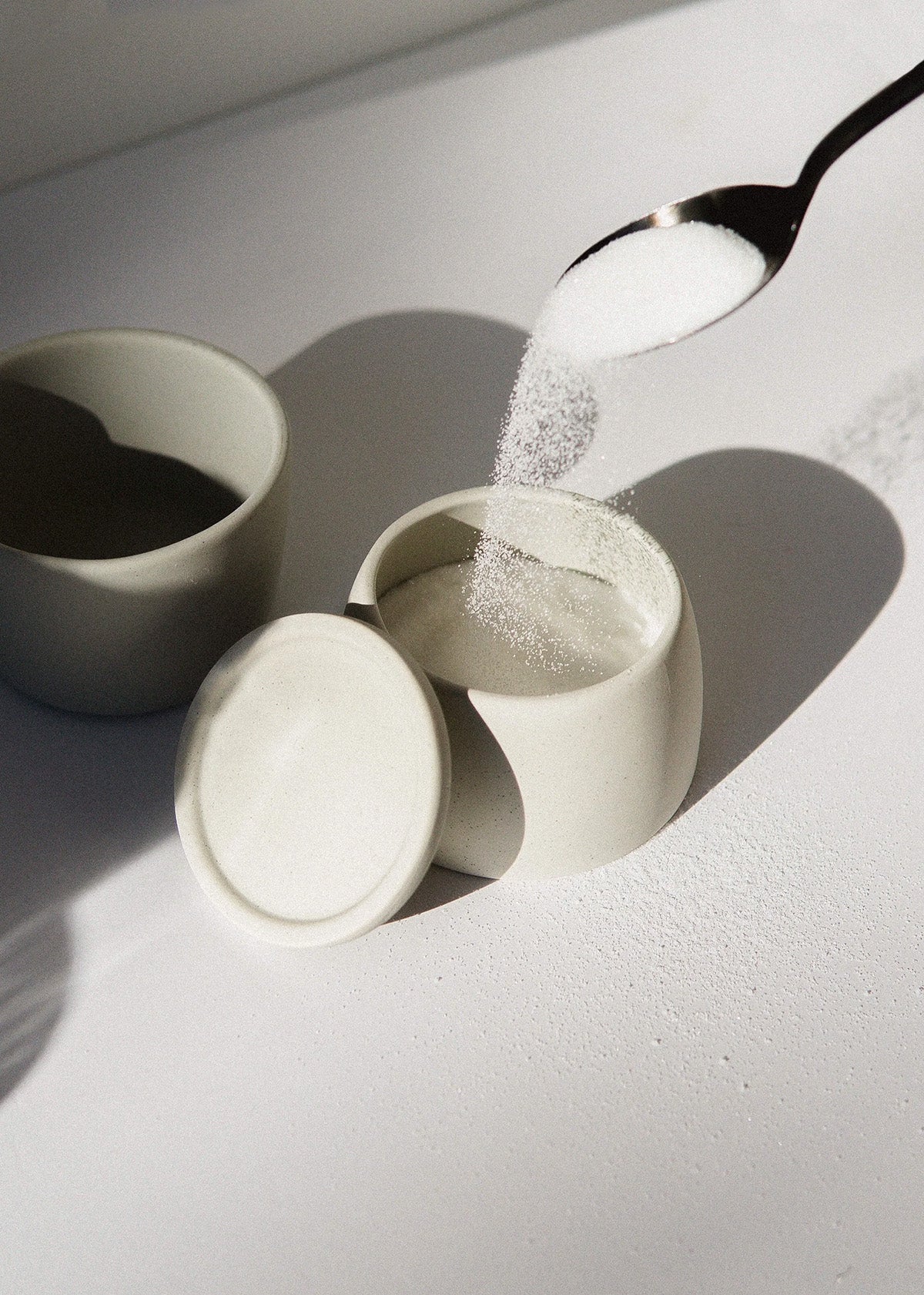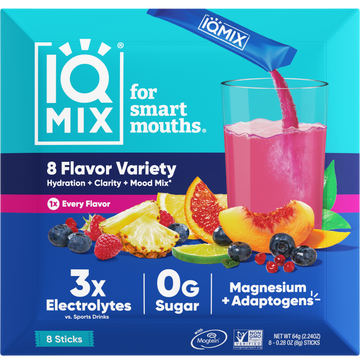You’ve likely heard of probiotics, the live microorganisms known to bolster gut health. Probiotics are naturally found in the gut, certain foods like yogurt and sauerkraut, and supplements.
But what about prebiotics? Prebiotics aren’t talked about as often as probiotics, but they’re equally important.
In this article, we’ll explain what exactly prebiotics are and the benefits they offer, from healthy digestion to immune support to weight management.
What Are Prebiotics?
Prebiotics are a type of dietary fiber naturally found in some fruits and vegetables, such as bananas, asparagus, and garlic.[*][*] They may also be isolated from these sources and sold as supplements.
Most prebiotics are considered carbohydrates, but not all. Cocoa flavonols are an example of a non-carbohydrate prebiotic.
Like other forms of fiber, prebiotics are indigestible, as humans lack the enzymes necessary to break them down. Instead, they travel to the lower digestive tract where they play an important role in stimulating the growth and activity of the beneficial bacteria (probiotics) in the gut.[*]
Simply put, prebiotics act as food for probiotics. They support our “good” bugs in strengthening stronger and multiplying, which serves our health in several important ways.
What Are the Health Benefits of Prebiotic Fiber?
#1: Improved Digestive Health
Because prebiotics stimulate the growth of beneficial microbes in the gut, they can improve certain aspects of gut health.
As your gut bacteria metabolize the prebiotic fiber from foods, they produce short-chain fatty acids, one of which is called butyric acid. This compound has been shown to increase the health of the intestinal lining.[*]
Additionally, a 2020 review found that treatment with a type of probiotic called inulin might help reduce constipation in people with irritable bowel syndrome (IBS).[*]
Another 2020 review looking at 21 studies found that prebiotic treatments effectively improved bloating, stool consistency, and number of bowel movements in people with chronic constipation.[*]
#2: Improved Metabolic Health
Consuming prebiotics has been shown to support certain aspects of metabolic health.
A 2019 review of 33 studies found that treatment with a type of prebiotic called inulin-type fructans (ITF) significantly reduced fasting blood sugar, HbA1c (average blood sugar level over the past 2-3 months), and fasting insulin levels.[*] The results were found to be most significant in people with prediabetes and type 2 diabetes.
Additionally, a 2021 review of 33 human trials found that inulin-type fructans significantly reduced blood sugar levels, total cholesterol, and triglycerides in people with prediabetes and diabetes.[*]
#3: Reduced Inflammation
The short-chain fatty acids produced when gut bacteria metabolize prebiotic fiber may help reduce inflammation. They're thought to accomplish this by maintaining the health of the intestinal lining, which in turn, may prevent the movement of pro-inflammatory molecules across the gut wall.[*]
This is supported by a 2017 review in which 14 out of the 29 prebiotic studies reviewed reported a significant decrease in one or more markers of systemic inflammation.[*]
#4: Reduced Appetite and Cravings
Looking to slash your cravings? Some research supports that prebiotic supplements like galacto-oligosaccharides and oligofructose-enriched inulin may reduce a person's appetite and cravings for specific foods (namely sugary foods).[*][*]
This relates to other research suggesting that supplementing with pre- and probiotics may support weight loss and fat loss in overweight people.[*]
#5: Enhanced Immune Function
Consuming prebiotic foods has been shown to result in alterations in the gut microbiota that support improved immunity.
More specifically, prebiotics help bolster the community of good bacteria in your gut, which crowds out the bad bacteria in the gut. This creates an inhospitable environment for pathogenic bacteria and other microbes to take hold.[*]
In addition to increasing resistance to pathogens, prebiotics also appear to increase the expression of anti-inflammatory cytokines (proteins produced by cells) while reducing the expression of pro-inflammatory cytokines.[*] This supports the immune system in reducing inflammation and promoting healing.
How to Load Up on Prebiotic Fiber
As mentioned earlier, prebiotics are naturally found in several foods. Top choices include:[*][*]
- Asparagus
- Garlic
- Legumes
- Onions, leeks, shallots, scallions
- Tomatoes
- Bananas
- Honey
- Wheat, barley, and rye
- Chia seeds
- Peas
- Oats
- Apples
Adding these foods to your daily diet is an excellent way to boost your prebiotic intake. If you’re feeling a bit adventurous, you can branch out with less-familiar prebiotic-rich foods, such as Jerusalem artichokes, chicory root, dandelion greens, psyllium husk, and seaweed.
IQBARs—keto and vegan protein bars—are another great source of prebiotic fiber, with each bar containing an impressive 6-9 grams of fiber to support the gut microbiome.
Each bar also offers 12 grams of pure plant-based protein and five key brain nutrients shown to support sustained cognitive energy, performance, and health. What’s more, IQBARs contain only 1-2 grams of sugar and are non-gmo, gluten-free, and soy-free!
To find your favorite flavors, try our Chocolate Lovers Variety Pack, Fruit Lovers Variety Pack, or 7-Bar Sampler. Already know which flavors you love? Go all in with a 72-bar Custom Case!
What About Prebiotic Supplements?
Getting prebiotics from whole food sources or clean convenience foods like IQBAR is ideal. That way, you’ll also receive the vitamins, minerals, and other nutrients in the foods.
That being said, prebiotics are also available as dietary supplements, typically as fiber powder or capsules.
As for how much prebiotic fiber to aim for, experts suggest that 2.5-10 grams daily is the minimum required for meaningful health effects.
Are There Any Downsides of Prebiotics?
Prebiotics are considered safe for everyone, but there is one side effect to be aware of. Because prebiotics ferment in the large intestine, consuming large doses can cause symptoms like bloating, gas, cramps, and diarrhea.
If you notice these symptoms, scale back your intake of prebiotic-rich foods or prebiotic fiber supplements until symptoms resolve. You can then slowly increase your consumption to allow your gut to get used to the increase in fiber.
A Final Word on Prebiotic Fiber
Prebiotics are incredibly important to maintain a healthy gut and overall health. They promote the growth of beneficial gut microbes which, in turn, influence health in a number of impactful ways.
To increase your prebiotic fiber consumption, get creative in the kitchen with the foods we shared in this article. And keep IQBARs on hand for a prebiotic-rich snack that boosts your brain and body wellness!



